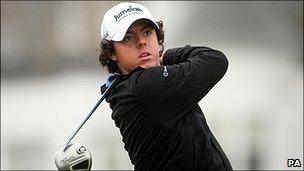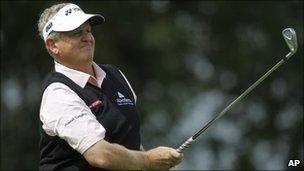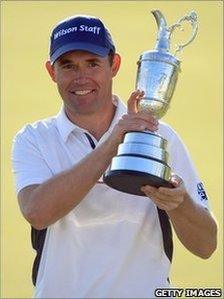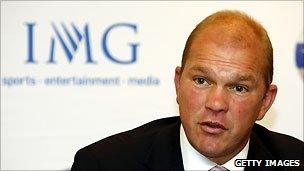Golf business looks for Open Championship boost
- Published
The UK golf industry stretches from the grass roots to multinational companies
The Open Championship golf tournament gets under way in southern England this week, with all eyes on Rory McIlroy to see if he can emulate his US Open success.
There has been much talk about the Northern Irishman becoming golf's next big-earning superstar, but behind the scenes and away from the greens there are other financial elements in play.
With the event being held at the Royal St George's course at Sandwich, the local Kent Invicta Chamber of Commerce is hoping the local economy will be given a boost.
And a host of other golf businesses will be hoping that a successful British Open, as the tournament is also known, will give their firms an added impetus.
Those commercial operations cover sponsorship, course management, player representation, and media rights, to course design, golf schools, and equipment manufacturers.
Kent County Council estimates the event is expected to be worth in excess of £80m to the local economy

Rory McIlroy from Northern Ireland is poised to become one of golf's biggest earners
"There will be several positive business factors from having the Open here," adds Kent Chamber of Commerce's vice-chairman Henry Nydam.
"With all the visitors coming there should be a fantastic boost in terms of tourism.
"We have also insisted that as far as possible the organisers use local producers and suppliers, and they seem to have done that."
One big backer of the Open, bank HSBC, is marking its first 12 months as a sponsor of the event, which it says it supports as a way of reaching potential clients in the UK and overseas.
The company has been sponsoring golf since 2002 with a number of tournaments in New York, Shanghai, Rio, and other parts of the world.
"For us to be able to pull it all together for the Jewel in the Crown - the Open Championship - as a global sponsor of golf, was an opportunity," says HSBC group head of sponsorship Giles Morgan.
He said the bank, which also supports grass-roots initiatives, was using its golf portfolio to reach a specific "client segment" around the world.
"Clearly something like the Open Championship is very well targeted at a corporate market, at our top clients, at the high-net-worth-individual," he adds.
One playing legend who could be called a high-net-worth-individual is Colin Montgomerie, who was in 2005 was the first man to win 20m euros (£17.6m) on the European Tour.
'Different ventures'
The Scottish player did not qualify for the Open, and is making the transition from the playing side of the sport to the business aspects, with interests in golf course design and coaching academies.

The UK's Colin Montgomerie has moved into the course design and golf coaching businesses
"I enjoy the business side of the game," says the 48-year-old, an eight times European Tour Order of Merit Winner.
"I have a lot of golf business ventures on, especially in the golf course design business," referring to his 20 courses already built, and half dozen under construction.
However, he acknowledged there has been a dropping back in lending by banks for golf construction ventures.
But he adds: "It has been very successful as a business, we are very lucky in golf, that we can do this.
"You can't design a tennis court, you can't design a football pitch or a dartboard."
Golfing accountant
Meanwhile, double Open champion Padraig Harrington, is also taking his first steps into the business world.
"I studied accountancy before I played golf and my intention was never to be a professional player," the 2007 and 2008 winner says.

Padraig Harrington says young golfers can now be open about their sport
"Now I am a pro I am still interested in what is around golf, you know, course design," adds the Irishman.
"If you get it right it is a career for life, get it wrong and it is a 'one-time-only' go."
And he believes that with three players - Luke Donald, Lee Westwood and Rory McIlroy - near the top of the global tree, it will provide a boost to grass-roots golf and encourage more youngsters to take up the sport.
"I think the youngsters are coming into the game a lot," the 39-year-old says.
"When I was growing up you didn't tell anybody you played golf. Nowadays kids are choosing golf as their first sport."
Meanwhile, a couple of hours from where play tees off on Thursday, a British golf business has been closely following the sport's development.
Motocaddy of Bishop's Stortford in Hertfordshire was founded in 2004, and since then has grabbed a spot on the leader board of golf trolley and caddy manufacturers.
Its hi-tech golf accessories have seen it successfully compete with many long-established American firms, but they admit they have had to be creative along the way.
"We have got a unique selling model, which allows us to have less stock, better margins, better cash flow, quicker turnover, better service reliability - all of these things," says Motocaddy chairman David Wells.
'Hopeful future'
One organisation well placed to give an overview of the golf industry, is global sports and media business IMG.
It is involved in many aspect of the game, including player management, licensing, publishing, golf hospitality and course design and management.

Mr Kinnings believes the UK golf industry can meet the challenges ahead
They have worked with the Open for a number of years, including handling the television rights.
Their managing director, Guy Kinnings, is also Colin Montgomerie's manager, and has a wide overview of the industry in the UK.
He says the Open is a "pinnacle" event, but also believes there should be more high-quality tournaments in the UK, particularly in England.
And he says that some other challenges remain, despite current good standing on the UK's top professional players.
"The sponsorship market is a little quiet, and golf clubs and some of the equipment companies are not finding it incredibly easy," he says.
"But hopefully that strength of what our pros are doing... will mean that we will have more golf for people to see at tournaments and on TV."